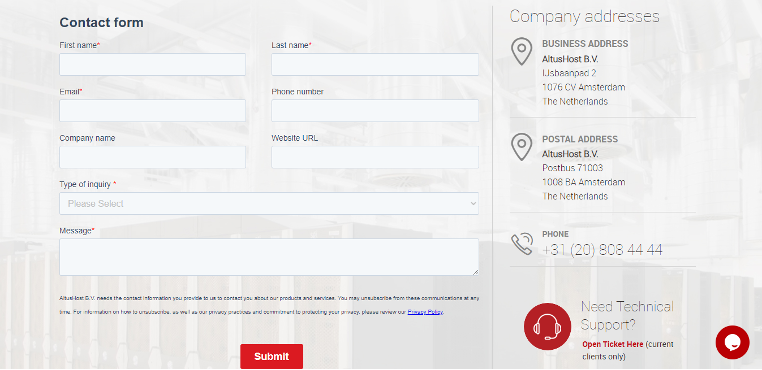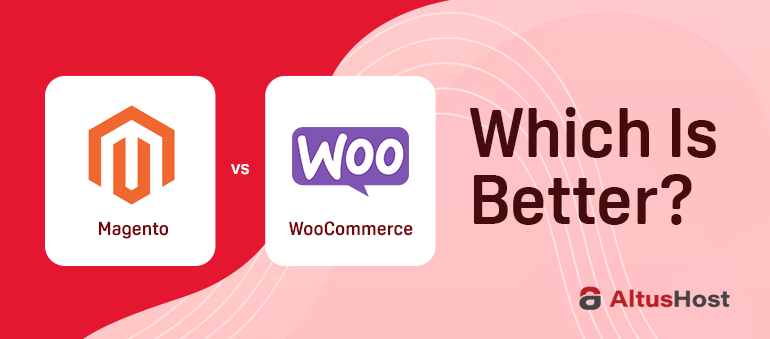Magento and WooCommerce are two of the most popular options in the eCommerce market. Both of them will offer you many benefits, such as easy customization, top-notch security, powerful performance, and a wide range of features.
In our detailed Magento vs. WooCommerce comparison, we have analyzed the providers across several categories, such as security, scalability, performance, support, and SEO ranking. So, let’s dive deeper into the comparison and see which platform might be better for your business!
Overview of Magento and WooCommerce
Magento is an open-source eCommerce platform with built-in PHP, enabling you to sell anything online. Nowadays, it hosts over 267,000 websites that benefit from its unique features like out-of-the-box functionality, various customization options, and seamless working with third-party tools like Magento Shipping Services by PluginHive.
At AltusHost, we offer an effortless, one-click automatic Magento installer, as well as other various features, which makes it simple to get started with Magento. Whether you are launching a new online store or managing a large one, we support Magento on all our web hosting plans!

Source: https://www.altushost.com/magento-hosting/
WooCommerce is a top-ranked WordPress-based eCommerce plugin that serves over 5 million websites that work flawlessly with WordPress and its thousands of themes. In addition, its open-source software allows you to create visually appealing websites and blogs and improve your eCommerce website.
Magento vs. WooCommerce – Detailed Comparison
With Magento and WooCommerce, your eCommerce site can gain thousands of customers on the top global marketplaces like eBay, Amazon, or Etsy.
However, although both platforms create fantastic online stores, Magento and WooCommerce have a few differences, which makes one of them better.
Performance
The speed and availability of your website are crucial for success, as they can attract or frustrate your customers. Slow loading time and frequent downtime result in poor user experience, decreasing page traffic and harming your website’s search engine ranking.
Magento comes with various features that improve your website’s performance, such as full page cache, image optimization, GZIP compression, and CSS minification. Each of these features will play a significant role in maintaining more page traffic and decreasing the loading times.
As WooCommerce comes with a variety of themes and plugins, you can easily access a speed-optimized theme or a plugin that offers lazy-image loading, compressing files, and caching that will reduce loading times. Moreover, you can increase the WordPress memory limit, which will effectively handle a lot of page traffic and provide users with a fast eCommerce experience.
If you decide to host your Magento store with us, we ensure you’ll get a top-notch performance due to our pure SSD storage and the LiteSpeed web server.

Source: https://www.altushost.com/magento-hosting/
Security
Website security is essential to protect your site and customer data from cyberattacks. You will also attract more customers if you have a highly secure web page, as they always seek high protection for their data.
Magento has built-in security features, such as regular backups and robust password management tools that enhance password management, prevent clickjacking exploits and cross-site scripting attacks, and improve file system permissions.
On the other hand, WooCommerce is highly secure due to the WordPress core system. Additionally, it comes with security practices like encrypting sensitive data, two-factor authentication, implementing firewalls, and regularly monitoring and patching vulnerabilities. However, the security risks when you utilize WooCommerce come from third parties that may attack WordPress.
By choosing AltusHost as your web host provider, we assure you you’ll get top-notch security features like DDoS protection, two-factor authentication, and free SSL certificates!

Source: https://www.altushost.com/magento-hosting/
Pricing
When you make a decision, the cost is one of the most crucial factors to consider. Therefore, you must evaluate all expenses contributing to an effective operational eCommerce website.

Source: https://pixabay.com/illustrations/ecommerce-selling-online-3021581/
Magento Open-Source is a free option that works great if you consider opening a smaller online store. You can enjoy mobile-optimized email templates, product variants like size, color, product fabric, and Google analytics. However, if you plan to open a more complex online store with more products and page traffic, we recommend you upgrade to a paid plan.
Adobe Commerce is the Magento plan with advanced marketing capabilities, technical support, application monitoring, and SSL certificates. Unfortunately, Magento doesn’t provide prices for this plan on the official website. Instead, you’ll need to provide your contact information and wait for a sales representative to contact you and give you the exact price according to your requests.
WooCommerce is initially free, but there are still some additional costs if you want your website to work issue-free. For example, you must pay for a domain name, web hosting, and SSL certificate.
The paid themes usually range from $50 to $100, and plugins and extensions start from $25. However, you can also find some that come for free in the WooCommerce directory, making this platform quite suitable for those on a tight budget and those who require more advanced eCommerce options.
If you want to cut costs, you can always choose some of our AltusHost web hosting plans that start at $5.56/month and offer free features, such as a free SSL certificate.

Source: https://www.altushost.com/magento-hosting/
Extensions and Plugins
Extensions enhance your website’s functionality and user experience. Fortunately, you will find a wide range of plugins you can add to your eCommerce website with Magento and WooCommerce.
Magento offers 5,660 free and paid third-party extensions to help you with finance, marketing, sales, payment, security, customization, site optimization, analytics, and customer support.
Compared to Magento, WooCommerce has 800 free and paid extensions that assist you with technological, logistical, payment, site optimizations, marketing aspects, and security.
In addition, since WooCommerce works flawlessly with WordPress, you can enjoy access to more than 58,000 WordPress plugins. This will help you quickly customize your eCommerce site regarding store management, payments, shipping, product types, enhancement, and subscription.
Scalability
To run a successful eCommerce website, you must choose the right platform that can increase your site’s ability to handle more page traffic.
Magento amazingly handles online stores with a lot of page traffic. It is perfectly suitable for businesses that sell over 1,000 products. Furthermore, Magento offers an ultimate solution to help you scale your eCommerce site through Adobe Commerce. This solution will allow you to create a multi-channel experience on a single platform. Adobe Commerce is flexible, scalable, and easily covers everything from marketing to payment.
When it comes to WooCommerce, they claim that they can handle the sales of an unlimited number of products. In addition, WooCommerce offers a wide range of plugins that boost its scalability possibility. However, compared to Magento, it requires more installations so that your website can keep up with business growth.
SEO and Marketing
Marketing strategies and SEO rankings are crucial for your eCommerce store if you want to attract more customers and, with that, sell more products.

Source: https://pixabay.com/vectors/presentation-statistic-boy-1454403/
You can enjoy the benefits of the built-in Magento SEO tools that will boost your site’s search rankings. It also has a Marketing Menu to help you manage promotions, content, and communications. Unfortunately, Magento doesn’t have a blog feature, so you should use an extension or help from Magento SEO Agencies.
Compared to Magento, WooCommerce comes with blog and innovative writing features, as it is WordPress-based. This allows you to customize your eCommerce marketing campaigns without unnecessary plugins or extensions. Moreover, you can incorporate extra elements into your blog sites and landing pages using shortcodes.
Ease of Use
Ease of use is crucial; sometimes, it may be the main factor affecting your decision. So let’s see how Magento and WooCommerce did in this category.
Magento is more suitable for professionals and medium to large online stores, as it requires you to have basic technical knowledge. It offers multiple setting up tutorials and guidelines only developers can understand, not beginners. Furthermore, you might spend much time figuring out how to set up extensions and customize the themes after installation.
In contrast, WooCommerce is beginner-friendly, mainly for users without technical expertise. It has a highly customizable WP-Admin dashboard that will help you easily personalize your eCommerce website in terms of design and add different features and plugins. WooCommerce also has a setup wizard that will guide you through the setup process, such as creating pages, setting up payments, choosing the payment currency, and setting shipping and tax options.
Support
Magento and WooCommerce guarantee that you will get superb customer support due to their live chat, email support, and different resources and communities to help you overcome any issue.
The most significant advantage of Magento is that the Adobe Commerce plan offers live chat and email support for its users. What’s more, the Magento Open-Source edition offers public resources and official channels for assisting you.
Also, if you choose us as your web host, we offer you 24/7 support for every aspect you may have trouble with.

Source: https://www.altushost.com/contact-us/
Furthermore, if you use WooCommerce, you won’t only benefit from the public forums and the official support platforms it offers. As WooCommerce relies on WordPress, you’ll benefit from its support options, such as live chat, email, social media, phone number, and self-service support.
The Bottom Line
After thoroughly testing Magento and WooCommerce, we can say that Magento is the overall winner due to its fantastic security and performance, combined with a wide range of extensions and plugins. Yet, both platforms provide various benefits depending on the specific needs of your eCommerce website.
Magento is a more powerful and feature-rich platform that is popular for those with more complex eCommerce websites with thousands of products and loads of page traffic. On the downside, it requires decent technical knowledge and is more costly. On the other hand, WooCommerce is a more user-friendly platform that is better for small to medium-sized businesses, as it is flexible and highly customizable.
So, evaluate your needs and set your expectations right before committing to one or the other!



